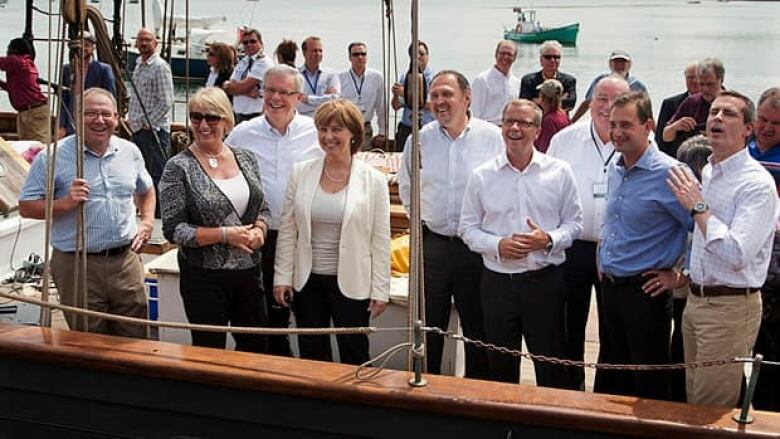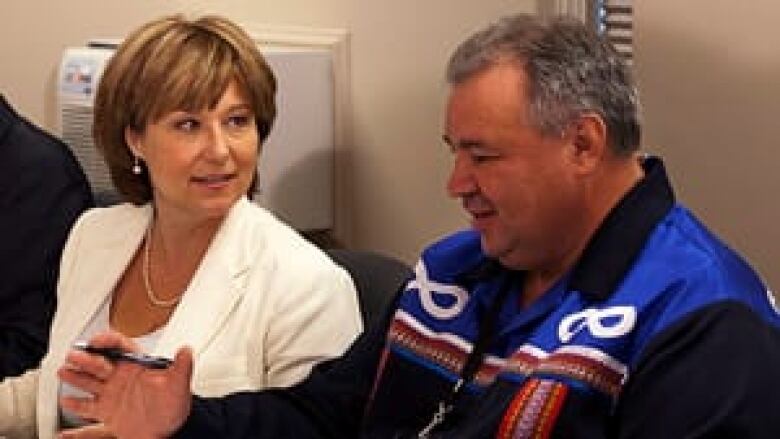Premiers, aboriginal leaders debate 'fair share'
Divisions over natural resource revenues looming for Council of the Federation talks

Aboriginal leaders and Canada's premiers said economic opportunity is the key to self-reliance as they emerged from a meetingWednesday in advance of the Council of the Federation gathering in Lunenburg, N.S.
But it was British Columbia Premier Christy Clark's frank assessment ofher province's "fair share" of economic opportunities from a controversial pipeline project thatdrew heat on the premiers' first daytogether.
Clark elaborated onB.C.'s demand for a bigger shareofthe revenuesshould the Northern Gateway pipeline to Kitimat, B.C. from Alberta's oilsands be approved. Asked what she would do if Alberta Premier Alison Redford retaliated in the face of B.C.'s resistance, Clark threatened to block the pipeline.
"If the proposal that British Columbia gets its fair shareif that's going to cause such a big problem that there are trade barriersthere is a very easy way to solve that," Clark said. "No pipeline."
Take our poll:
Would you side withRedford or Clarkon the Northern Gateway pipeline?
Asked how much revenue she had in mind, Clark said she didn't have a number yet, "and I'm not going to negotiate that in public."
Speaking to guest host Hannah Thibedeau on CBC News Network's Power & Politics, cabinet minister John Baird seemed unimpressed with Clark's conditions for approving the pipeline across her province, calling her comments "deeply disappointing."
"We can't have a Canada where we try to toll gate different goods and services in different parts of the country," he said, calling the oilsands a"great resource for Canada" that has to get to market.
"We should all be in the same boat rowing together," Baird said. "It's certainly not a welcome addition to federal-provincial relations."
Baird noted his government's "strong support" for the project, mentioning recent efforts to expedite its environmental review process.
As for Alberta's premier, Redford tried to avoid direct confrontation with Clark when scrummed later by reporters looking to her to strike back.
Redford is set to make a presentation to other premiers this week about her proposal to establish anational energy strategy.
"There's no doubt that we're not going to resolve these issues in the next four or five days," Redford said. "It would be wrong for anyone to characterize that we're not going to talk. But at this point in time, this isn't the week for it."
Summit planned on violence against women
Nova Scotia Premier Darryl Dexter, Shawn Atleo, national chief of the Assembly of First Nations, and other aboriginal leaders sounded pleased with the meeting as they took questions from reporters.
The premiers areall interested in looking to economic opportunities and working with aboriginal groups, Dexter said.
Jeannette Corbiere Lavell, president of the Native Women's Association, and Manitoba Premier Greg Selinger areplanning a summit this fallto look at ways to preventviolence against aboriginal women and girls.
Dexter wouldn't commit the premiers to push for an inquiryinto missing and murdered aboriginal women, but Atleo pointed to the aboriginal leaders' recommendations to the premiers tohave police forces better co-ordinate on those cases.
Dexter says the premiers feel there are too many unnecessary barriers created by the federal government when dealing with emergencies on reserve lands, and that they "need the federal government to have a clear and consistent approach."
Urban aboriginals 'next labour force'
Manitoba Mtis Federation leader David Chartrandsaid the leaders are leaving the meeting with clear directions on how to advance. But he noted their continuing desire to have a first ministers meeting with Prime Minister Stephen Harper.
"Todays discussion on duty to consult and clarity is, I think, a very, very big direction that the premiers are taking,"Chartrand said.The national chief of the Congress of AboriginalPeoples, who represents urban aboriginals,said they're the fastest growing population in Canada that can feed gaps in the workforce.

"It's very important because we are a young generation, we are fast-growing and we are the next labour force for Canada. We do not need to be bringing in immigrants. We are ready and prepared to work. We are a mobile people. We just need a little bit of help," said Betty Ann Lavalle.
The meeting todayin Lunenburg comes in advance of the annual Council of the Federation summit on inter-provincial relations.
The premiers, like Atleo, are consumed with devising better ways to develop natural resources so that more people can benefit and so that the environment does not pay too steep a price.
Dexter said the Nova Scotia government and othersare already working to ensure First Nations groups have a say in resource development.
"Government on a day-to-day basis makes so many decisions that to keep it on the forefront of your mind is sometimes a challenge. But we have found that with experience, we've gotten better at it," he said.
'Full partners' in natural resources
Fresh off his re-election as national chief, where he was criticized for being too friendly with the federal government, Atleo said the federal government has to "assume their rightful responsibility to work with First Nations on how this has to be driven at the regional and local levels."
"What it's time to do is to recognize that these rights are real, that they're legal, that they're valid. We must be, as [the Canadian Council of Chief Executives] said, full partners and not be an afterthought when a major project or development is being considered. It must be early engagement and it must be often."
The Canadian Council for Chief Executives indicated earlier this month that aboriginal communities should be fully included in energy and mining developments
Some leaders referred to a national energy strategy, something Redford has talked about, butdetails of what that strategy would look like are vague, and buy-in from all the provinces is uncertain especially now that Alberta and British Columbia aresparring openlyover the Northern Gateway pipeline.
Clark says shipping heavy oil poses a unique challenge for the environment, and she's fighting to make sureher province canprotect its environment. She said she raised the issue this week because it would have been disingenuous not to mention it when she was meeting with her counterparts to discuss energy policy.
At their annual general meeting last week, First Nations chiefs made it clear they will insist on playing a larger role, either through negotiation with the provincial and federal governments, through the courts or through protests and blockades, Atleo said Tuesday in an interview with The Canadian Press.
Indeed, many individual First Nations are in the midst of opposing some of Canada's largest resource developments: the Northern Gateway pipeline to take Alberta bitumen to the West Coast; the Plan Nord for Quebec and the Ring of Fire mineral deposit in northern Ontario.
The conflict "becomes a familiar pattern that we're trying to break out of," Atleo said.
with files from the Canadian Press












_(720p).jpg)


 OFFICIAL HD MUSIC VIDEO.jpg)
.jpg)



























































































